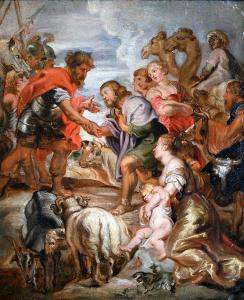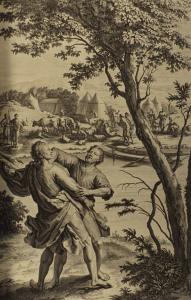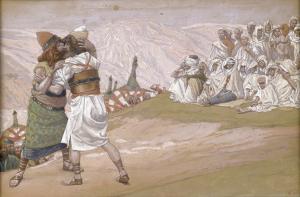 I imagine that most of you can easily finish my chosen title today by adding “And he is us.” This phrase was made famous by the cartoonist Walt Kelly in his “Pogo” strip, but the phrase itself was apparently first used on a poster created in 1970 to emphasize the importance of Earth Day, an importance that has only dangerously increased in the last 50 years. To explore the origins of the phrase a bit further, it was a significant paraphrase of a huge boast from Admiral Perry of the American Navy, sent to President Benjamin Harrison after a victory at sea during the War of 1812: “We have met the enemy, and he is ours,” crowed the admiral. In the climate in which we now are living, both the climate of the physical environment and the climate of COVID-19 and the Black Lives Matter protests against police brutality, we have very little to crow about, but a great deal to face up to as we are confronted with our human failings. As Pogo has it, we really are the enemy we most need to wrestle with.
I imagine that most of you can easily finish my chosen title today by adding “And he is us.” This phrase was made famous by the cartoonist Walt Kelly in his “Pogo” strip, but the phrase itself was apparently first used on a poster created in 1970 to emphasize the importance of Earth Day, an importance that has only dangerously increased in the last 50 years. To explore the origins of the phrase a bit further, it was a significant paraphrase of a huge boast from Admiral Perry of the American Navy, sent to President Benjamin Harrison after a victory at sea during the War of 1812: “We have met the enemy, and he is ours,” crowed the admiral. In the climate in which we now are living, both the climate of the physical environment and the climate of COVID-19 and the Black Lives Matter protests against police brutality, we have very little to crow about, but a great deal to face up to as we are confronted with our human failings. As Pogo has it, we really are the enemy we most need to wrestle with.
As usual for me, an ancient story from the Bible springs to mind, one of that book’s more famous and more enigmatic tales. It comes from the book of Genesis, chapter 32:22-32. The story is known in shorthand as “Jacob wrestles with the angel” or “Jacob wrestles with God,” but I think both of those familiar designations are quite wrong. The matter of just who is Jacob’s wrestling partner is important; the answer to that conundrum will in part at least determine for the reader what this mysterious account is actually about. It must be read carefully, as must all biblical narratives, for there are subtleties here that the writer built into the story that must not be missed. In addition, a full understanding of the peculiar story cannot be divorced from the confrontation that Jacob has with his brother Esau in the next chapter; Gen.32 must not be read apart from Gen.33.
The immediate context of the lengthy tale of Jacob, whose name in the language means “taker” or colloquially “grabber,” finds the hero on his way out of Haran, the original homeland of the people of Israel, according to ancient tradition. Jacob is there because he was running for his life from his enraged brother, Esau, having tricked his dense sibling out of both birthright and blessing, the first with the help of his mother Rebekah and the latter with (perhaps) the help of his dying father, Isaac. While in Haran for 20 years, the wily Jacob tricks his uncle Laban out of the very best of his flocks and herds, marries both of his daughters, the first of whom, Leah, bears him six sons, and whose maid Bilhah bears him two more sons, while Rachel, the second daughter of Laban, with the aid of her maid Zilpah, bears two more sons. In addition, Leah bears Jacob a daughter. Finally, Rachel herself bears the child Joseph. After this long struggle of child bearing, Jacob determines it is time to head home to Israel. Laban is loath to let Jacob go, since he has made both of them quite rich, but Jacob leaves and one night finds himself at the ford of the river Jabbok. Just before his large retinue camps there, he tries mightily to buy off his brother whom he has not seen in two decades. However, they parted in fury, and Jacob is convinced that Esau still wishes his brother dead. Huge gifts are sent to Esau—two hundred female goats, twenty male goats, two hundred ewes and twenty rams, thirty milking camels and their colts, forty cows and ten bulls, twenty female donkeys and ten male donkeys. It is an enormous bribe, designed to calm the anger of his brother.
With the bribe sent, Jacob now moves his entire family and all their goods across the Jabbok, and Jacob is now alone. And here the great mystery begins. “A man wrestled with him until sunrise,” we are told (Gen.32:24). Who this man is we are not told, but the two of them are locked in ferocious combat all night long. “When he (the man) saw that he could not win, he struck (or “touched”) him at the hip joint, so that Jacob’s hip was dislocated as he wrestled with him” (Gen.32:26). The man seems to employ a tricky or illegal maneuver in his attempt to win the match, but even with a disjointed hip Jacob wrestles on. Now the man is desperate: “Let me go, because the day is breaking” (Gen.32:26)! Just who is this man? Dracula, who cannot withstand the light of the sun? But Jacob immediately says, “I will not let you go until you bless me” (Gen.32:26)! Jacob imagines that this unnamed man is able to offer him a blessing, however painfully it is wrenched from him.
“What is your name,” asks the man? “Jacob.” “No longer will you be called Jacob,” replies the man, “but Israel, because you have wrestled with Elohim and with humans, and you have won” (Gen.32:28). “Then Jacob asked, “Tell me your name” (Gen.32:29)! And the man replied, “Why in the world do you ask my name? Then he blessed him there” (Gen.32:29). “So Jacob named the place Peniel (“face of God”), because, he thought, I have seen Elohim face to face and I am still alive (Gen.32:30)! “As he passed Penuel, the sun rose upon him, limping due to his hip” (Gen.32:31). The final verse suggests that the entire story is an explanation, an etiology, of why Israelites do not eat certain portions of the thigh of the creatures they devour; I find this verse less than helpful as we try to understand what we have just read.
Note that it is only Jacob, one of the Bible’s supreme tricksters and liars, who thinks he has had a wrestling match with God. Why should we believe him at all? The story says only that his partner was a man. He is a man who refuses to admit who he is, only demanding that Jacob release him before sunrise. He does bless Jacob, but only after the man has announced that the newly named Israel has wrestled with God and humans and has won! In every part of the tale, save Jacob’s limp, it is Jacob who has won this match and who has been blessed. In short, Jacob is both victorious and blessed in the bargain. Has he wrestled with God? I think not. I think his wrestling partner was Jacob himself! In self-conversation Jacob pictures himself as winner over all and blessed nevertheless. If the story ended there, the clever Jacob has proven himself master and winner in every way.
But the story cannot and does not end there, because the victorious Jacob has still to face his brother. And at this point in the story he expects that meeting to be a bloody one. He is quickly told that Esau has been spotted coming Jacob’s way, accompanied by 400 warriors. The jig is up! Jacob divides his family into three parts, Leah’s maids and children in front, Leah and her children behind, and lastly Rachel and Joseph. Jacob himself resolves to lead them all toward Esau, bowing obsequiously in the dirt 7 times, clearly in a final attempt to calm the fury of his brother. But the tale ends in a startling and astonishing way. “Esau ran to meet him, embraced him, fell on his neck and kissed him. And they wept” (Gen.33:4). But I dare say that Jacob and Esau weep for two very different reasons! Esau is amazingly happy and overwhelmed to see his wily brother once again, while Jacob is just overwhelmingly happy to be alive! “Who are all these with you,” bubbles Esau, gazing at the women and the children (Gen.33:5)? “And what was all that stuff I met on the way here,” referring to Jacob’s elaborate bribe (Gen.33:8)? Though Jacob sternly urges Esau to keep all the stuff he sent, Esau flatly refuses, claiming he has plenty and needs no more. Still Jacob pleads with his brother to accept his gifts, because, he concludes, “Seeing your face is just like seeing the face of Elohim, because you have accepted me” (Gen.33:10).
I suggest that the supposedly victorious and blessed Jacob was stopped cold in his tracks by the completely unexpected acceptance of his brother Esau. “Seeing your face is just like seeing the face of God,” he says, and whether he actually understands that as the very stuff of unmerited grace that it is, his statement rings true in his life, a life up to now ruled by cleverness and trickery, by individual desires and success. Jacob in fact did not wrestle with God at Jabbok; he instead saw God in the face of his discarded brother.
Like us, Jacob was his own worst enemy, imagining that he was all he needed for success and power. In these days of pandemic, we wear masks because we are not all that matters in the world. And in the midst of an awakening to our own racism, we find that our supposed victories as white people have too often come at the expense of our Black and Brown fellow citizens, due to the enormous power of our own white racism that has made us winners and at the same time made them losers. Jacob, the wily, is alive and well and living in us. May we meet the surprise of God’s grace in the unexpected as we struggle to overcome our individualism and self-possession and move toward a community of true equality and grace for all.
(Images from Wikimedia Commons)











